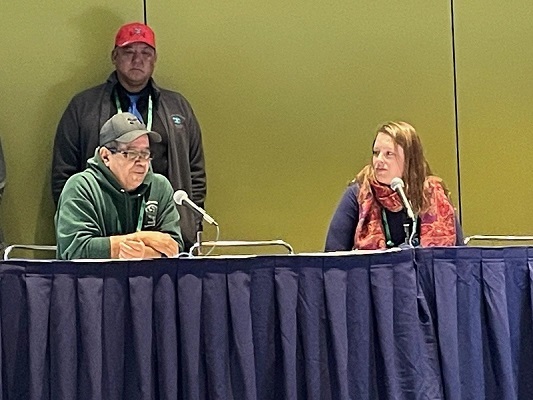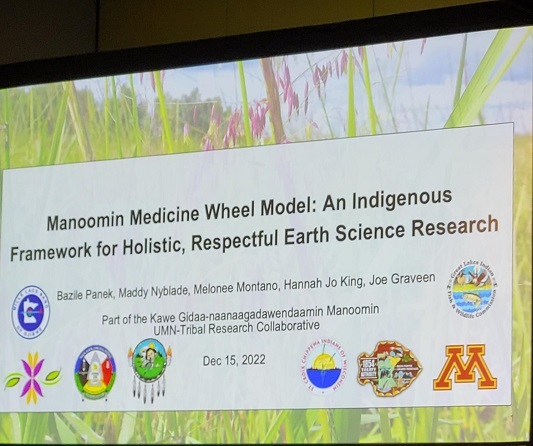
Research team focuses on tribal priorities and approaches
LDF Tribal Member Joe Graveen recently traveled to Chicago to share his decades of knowledge gained from harvesting manoomin or wild rice. He’s part of a group of tribes and University of Minnesota-Twin Cities academics researching the culturally significant plant, which is not only a food source but part of the origin story of Ojibwe People.
“This research is important because it honors and respects tribal sovereignty, tribal data, indigenous knowledge and it establishes protocols in working with tribal governments, tribal communities and tribal natural resources departments in understanding and protecting manoomin,” Joe says.
Alongside his research partners at the American Geophysical Union (AGU) Fall Meeting, Joe, who serves as our wild rice cultural enhancement program manager, discussed bringing together Western science and Indigenous knowledge to create a greater understanding of manoomin and the actions required to protect the plant. A 2020, Great Lakes Indian Fish and Wildlife Commission study found manoomin decreased by 50 percent over 30 years in the Upper Great Lakes Region.
“One must remember that manoomin is culturally and spiritually connected to who we are as Ojibwe People, through our prophecies and stories,” Joe says. “Manoomin, like our language, if we lose it, we do not exist as Ojibwe People.”
Joe kicked off a roundtable discussion captured in this YouTube video about the cultural importance of manoomin, the need for respectful collaboration, and advances in biophysical and social science around revitalizing wild rice. Entitled Bringing the Spirit Back to Science: A Tribal-University Methodology for Re-search Co-Production, the team assembled graphical images and research findings that are attached to this article.
“A lot of hard work and collaboration among partners went into this research,” Joe says. “The opportunities are endless. I am hopeful that this partnership will bring lasting relationships and more science into understanding what’s leading to the decline of our manoomin and how to restore it in the Upper Great Lakes Region.”
According to the AGU website, it is the most influential event in the world dedicated to the advancement of Earth and space sciences.
Every year, the AGU Fall Meeting convenes more than 25,000 attendees from 100-plus countries to share research and network. Researchers, scientists, educators, students, policymakers, enthusiasts, journalists and communicators attend the AGU Fall Meeting to better understand our planet and environment, and our role in preserving its future.
Beginning in 2017, Upper Great Lakes Tribes, intertribal treaty organizations, and University of Minnesota-Twin Cities came together to protect manoomin through the Kawe Gidaa-naanaagadawendaamin Manoomin (First We Must Consider Wild Rice) re-search collaborative which centers on tribal priorities and approaches.

